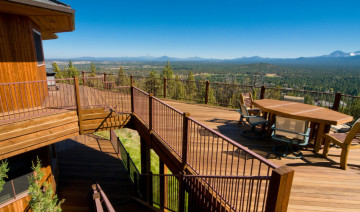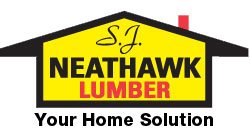{article.name}
Attaching Posts to a Rooftop Deck

- Share this:
- Share on Facebook
- Pin on Pinterest
- Tweet on Twitter
Q. How can I mount newel posts to a deck on a flat roof without cutting into the roof?
A. Paul Nichter, a contractor in Islesboro, Maine, responds: I’ve been building wood decks with safe railings over flat EPDM roofs on the rainy coast of Maine for over 15 years without compromising the waterproofing. I avoid the traditional method of bolting a 4x4 post deep into the framing, as it penetrates roof surfaces and increases the possibility of a leak long before either the decking or the roof membrane is worn out from age.
My approach to keeping water out while achieving good resistance to lateral forces is two-pronged and is based on the deck being built on sleepers above the roof.
First, I design rooftop decks with corners every 6 feet to 12 feet to stabilize the railing. Lateral loads aren’t borne by just one post; rather, the loads are shared with adjacent posts.
Second, I mount the posts with hardware that bolts to the top of the deck (see illustration). Each post is a hollow box that fits over a vertical threaded rod. The rod threads into a 3/4-inch nut welded to the center of a 1/4-inch-thick steel plate. I secure the plate to the deck with four 21/2-inch RSS Structural Screws, but galvanized lags would work too. The screws or lags should be as long as possible without protruding from the bottom of the sleepers and putting holes in the roof membrane. It is essential to place 2x12 blocking on the flat between the sleepers at post locations so the lags will have something solid to bite into.
Once the plate and rod are installed, I stand the post in place. Usually, some scribing and fitting are needed to make it stand plumb without wobble or lean. Then I run a bead of construction adhesive on the bottom of the post and seat it on the deck surface.
A second piece of 1/4-inch plate fits at the top of the post in a rabbet cut for that purpose. The threaded rod runs through a hole drilled in the plate, and the assembly is drawn tight with a nut. The nut tensions the threaded rod, compressing the post and creating a solid connection.
I’ve also used manufactured posts. One advantage of using them is that their makers have tested them for code compliance.

Chuck Lockhart: A threaded rod between one plate screwed to the framing and another plate at the top of the post firmly connects a hollow newel to a rooftop deck.
Sign up for our Email List
Stay updated with all our latest posts, products and offers! Just enter your information below.

Comments